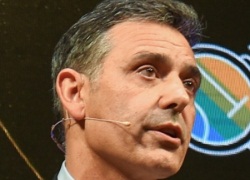Where will we see the first impact of 5G in the Internet of Things, and how will it change services? To find out, Jeremy Cowan talks to Stephan Gatien, general manager of the Telecommunications Business at SAP.
Vanilla Plus: Which industry sectors will benefit most from 5G (e.g. Automotive, Retail, Media & Entertainment, Manufacturing, Energy & Utilities, etc.) and why these ones more than others?
Stephan Gatien: There is a broad consensus that the unprecedented leap in bandwidth speed and the low latency expected from 5G will benefit many industries and vertical scenarios.
Many industry sectors will be able to achieve business benefits if they can fully harness these key 5G characteristics and apply it to domains with a sizable addressable market and ideally immediate demand. Domains like connected automotive, smart manufacturing and maybe connected energy will definitely be at this intersection of technology relevance and market potential.
The automotive industry will clearly benefit from 5G to accelerate the transition to autonomous driving or to fulfill the promises of scenarios like truck platooning. I also believe that 5G enabled virtual reality (VR) and augmented reality (AR) will transform and possibly revolutionise the way we consume content (Media & Entertainment) and probably the way we learn and work.
Finally, and as illustrated by a number of initiatives from many 5G front runners, smart cities and improving lives of citizens will be a major focus through scenarios like video and parking monitoring, traffic management or pollution management.
Vanilla Plus: Is there one primary motivation for investing in 5G networks and services such as creating new revenues, cutting OpEx costs, or improving the customer experience?
SG: There is a strong contrast, at the moment, between the potential impact of 5G on many industry and social domains and how challenging the development of the business case for 5G seems to be for many operators. Gavin Patterson, the CEO of British Telecom, was pretty open about this recently, acknowledging BT’s struggle to justify a massive investment in 5G for now.
However, even though the full business case for 5G may still need to be built, a majority of network operators realise that 5G will likely allow them to streamline their network architecture while opening up new revenue streams, particularly if they can extend their services beyond pure connectivity.
Vanilla Plus: What are the barriers to adoption of 5G for communication service providers and IoT service providers investing in 5G infrastructure?
SG: As discussed above, one key barrier is going to be the development of the business case for 5G to justify this substantial investment. Beyond this, the adoption of 5G will potentially highlight some of the go-to-market gaps some communications service providers may face as they seek new revenue in various vertical markets and stretch their traditional service portfolio. In a related way, the ability to create and develop an ecosystem of partners in specific vertical markets may constitute a barrier to some.
Vanilla Plus: How can SAP help overcome these difficulties?
SG: We have been approached by a few communication service providers to engage in a reflection on the business case for 5G. As a result, we established a ‘5G Business Council’ during MWC 2018 to collaborate with service providers on various monetisation strategies for 5G.
Separately, I believe that the multi-industry DNA of SAP and our broad customer base can be a formidable asset to partner effectively with service providers and help them bring to life some of the new scenarios discussed earlier. For use cases such as connected automotive or connected energy, we bring to the table a deep understanding of these industries but more importantly a very large footprint (97% of Automotive and 87% of Energy and Natural resources customers in the Forbes 2000 list run SAP).
A good illustration of this is the very effective collaboration SAP and NTT have had for 18 months to jointly develop innovative solutions in the IoT space for Transportation Safety and Construction.

Vanilla Plus: In which countries or regions will we see the first benefits of 5G, such as faster data speeds, lower latency and increased bandwidth?
SG: I believe that Asia, North America and western Europe will be the regions with the most action in the near future. In Asia, countries like South Korea and Japan are at the forefront of the race to 5G. In North America, and particularly in the US, AT&T and Verizon have been pretty vocal about their ambitions to be the first carriers to offer 5G services.
Vanilla Plus: Will we see industrial and smart city pilot schemes in 2018 or full scale 5G deployments
SG: Yes. There seems to be a number of smart pilot projects in progress in various parts of the world. South Korean operators took advantage of the winter Olympics to pilot 5G. Large players like Telefonica, Verizon or AT&T are partnering with municipalities to explore the potential of the 5G technology. In my opinion, full scale 5G deployments will not happen before 2019/2020.
Stefan Gatien of SAP was talking to Jeremy Cowan, editorial director & publisher of Vanilla Plus
Comment on this article below or via Twitter: @VanillaPlus OR @jcvplus






